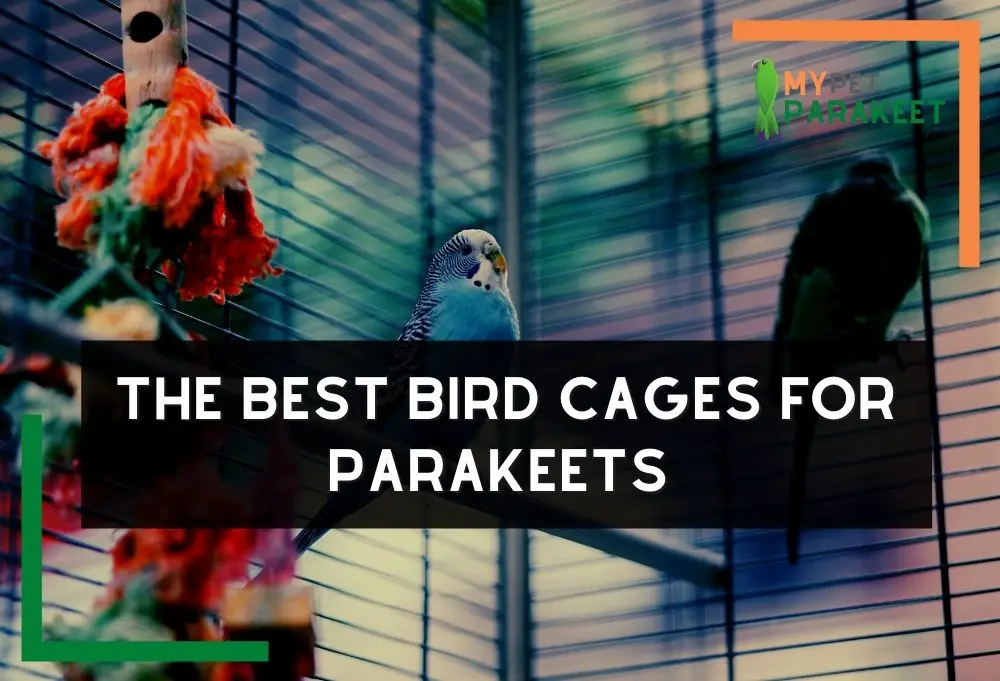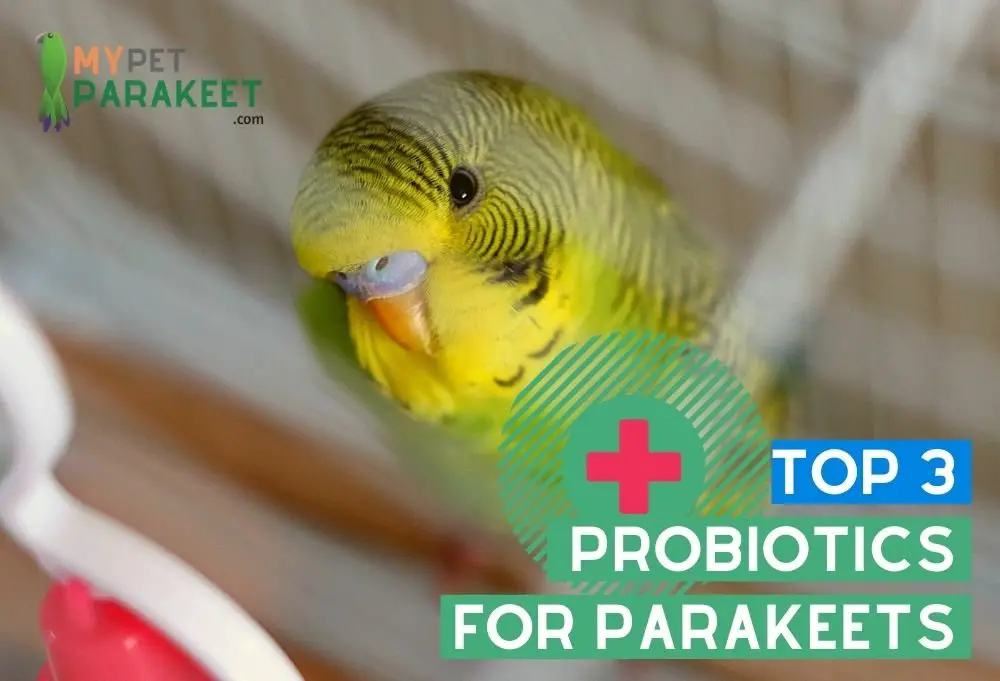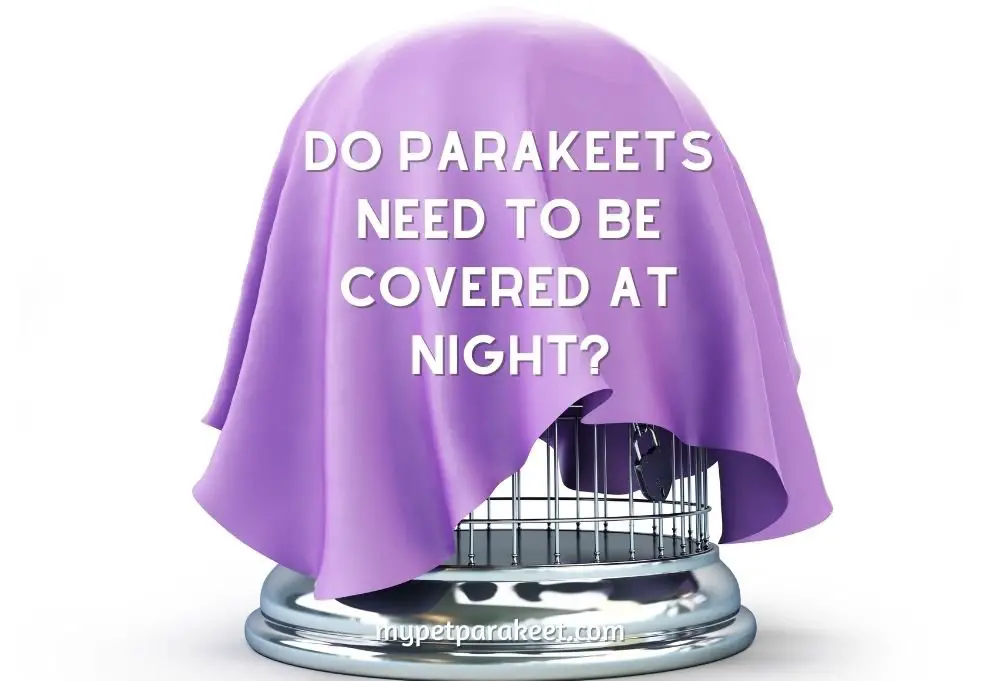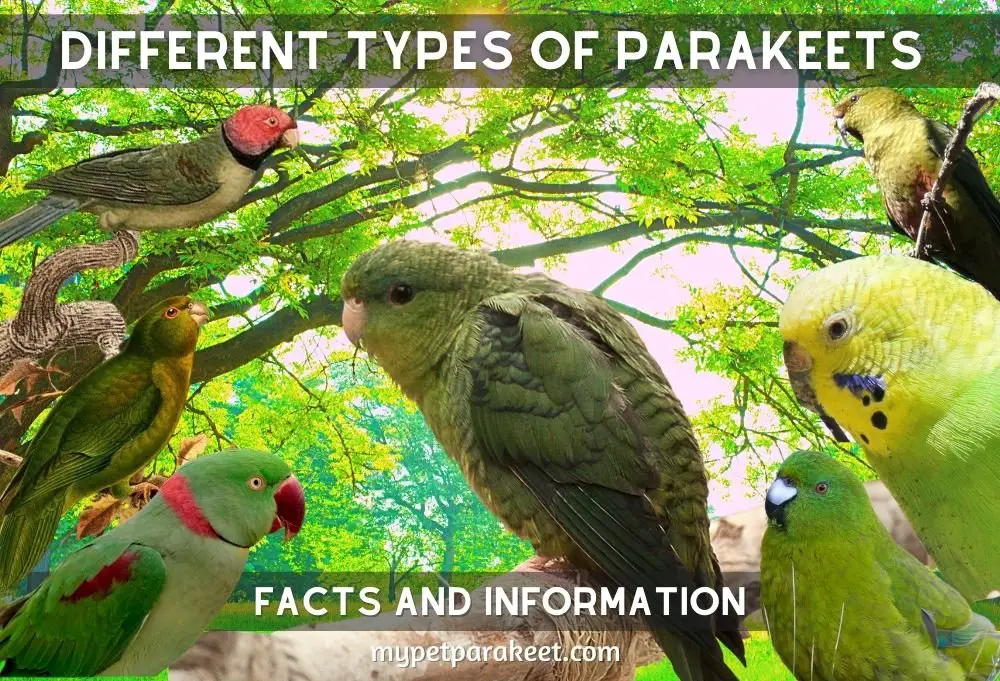Parakeets are a diurnal species, so they should be active through the day and sleep through the night. Sometimes, a parakeet can start to sleep much more suddenly, and as bird owners, this can be pretty concerning.
It can be expected for a pet parakeet to take an afternoon nap. Still, if you think your parakeet is sleeping too much or more than average, then there is likely a reason behind it: poor night's sleep, poor diet, uncomfortable temperature, depression, or an unseen illness.
Read on to discuss these reasons in more depth and how you can encourage your parakeet to have a restful sleep.
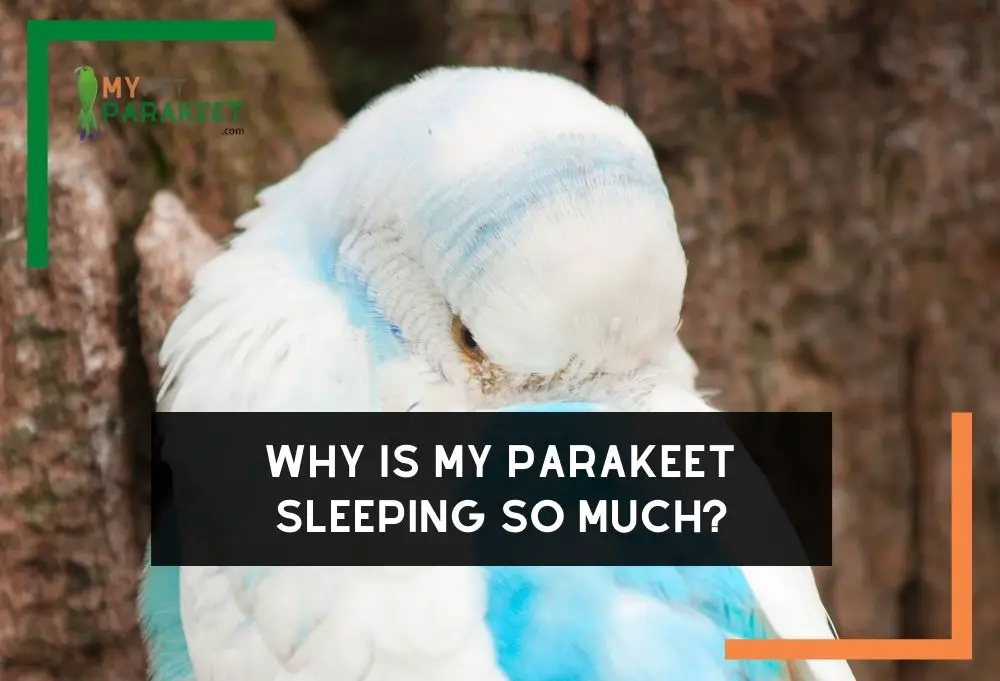
Why Is My Parakeet Sleeping So Much?
Poor Nights Sleep
If you notice your parakeet is sleeping a lot more, whether going to sleep early, sleeping in longer in the morning or sleeping through the day, it may be a sign that it didn’t get enough sleep through the night.
If the environment provided for your parakeet is not quite right, it could cause issues with sleeping through the night. It may be being disrupted by light, noise or shadows.
Just like we do, Parakeets have different stages of sleep that provide them with various benefits. They will cycle through these stages through the night, so interrupted sleep can middle with this cycle and reduce the restful benefits of sleep.
Sleep scientists have proven that it should be uninterrupted to get the best benefits from sleep, even for birds!
Poor Diet
What your parakeet eats will be what is powering their little body and all their behaviors. They may feel low in energy and sleep more if their diet doesn’t provide them with the proper vitamins and minerals to metabolize into energy.
Nutritional deficiencies are most commonly seen in parakeets that eat seeds exclusively. While seeds do make up an essential component of their diet, they do not require the proper levels of protein and calcium for a healthy bird.
Many birds who eat exclusively seed will selectively eat by picking out only their favorites and not getting the full benefit of a balanced seed mix.
You should ensure you are offering a wide range of varieties, including seeds, pellets, fresh vegetables, and fruit so that your parakeet can get all it needs to a bright and alert day and a restful night of sleep.
See here for our complete guide to feeding your parakeet.
Wrong Temperature
Sleeping is natural when animals feel uncomfortable with the temperature around them, especially if they feel too cold.
Sleeping is a way to conserve energy in the cold as everything takes a lot more energy when the internal body temperature is low. If you see your parakeet fluffed up and potentially shivering, they may be too cold!
Make sure the environment they are in is sufficiently warm, there’s no cold breeze, and ideally, they have an opportunity to bask in the warm sunshine. See more tips for keeping your parakeet warm here.
A parakeet that is too hot may also be less active and sleep more. The heat can drain us all of our energy, birds included! If you see your bird trying to cool itself down in addition to excess sleep, it might be trying to tell you it’s too hot.
Signs of heat stress in birds include panting and holding the wings away from the body to try and increase cooling airflow.
Depressed
Parakeets are active, social, and curious animals and in their wild habitats, they will be busy all day long chattering to other parakeets, looking for food, and investigating their habitat.
As pets, there is significantly less for them to do. If they become bored and lonely, they can become quite lethargic and depressed. Other signs of depression include feather plucking, stress bars, and aggression.
Mental and physical stimulation is vital for the parakeet's health. Ensure you socialize with them a lot and maybe provide them with another feathered friend. Your parakeet should also have lots of changing toys, furnishings, and fun enrichment.
Illness
Last but not least, the reason your parakeet may be sleeping so much is that they may be sick. As a prey species, parakeets are experts at hiding when they are ill, as illness leaves them incredibly vulnerable.
This vulnerability will leave them open to being predated on but can also cause other flock members to reject them and kick them out of the group as they create a weak point and a waste of resources for the group. So it’s no wonder your parakeet will try to hide when it is sick!
Lethargy is the most common symptom that something is not right with a parakeet. It is a symptom associated with many common alignments and illnesses, so it can be hard to know what’s wrong.
Watch your parakeet closely for any other signs. Especially pay close attention to their appetite and their fecal. Contact a vet as soon as you feel concerned, as sick birds can deteriorate rapidly.
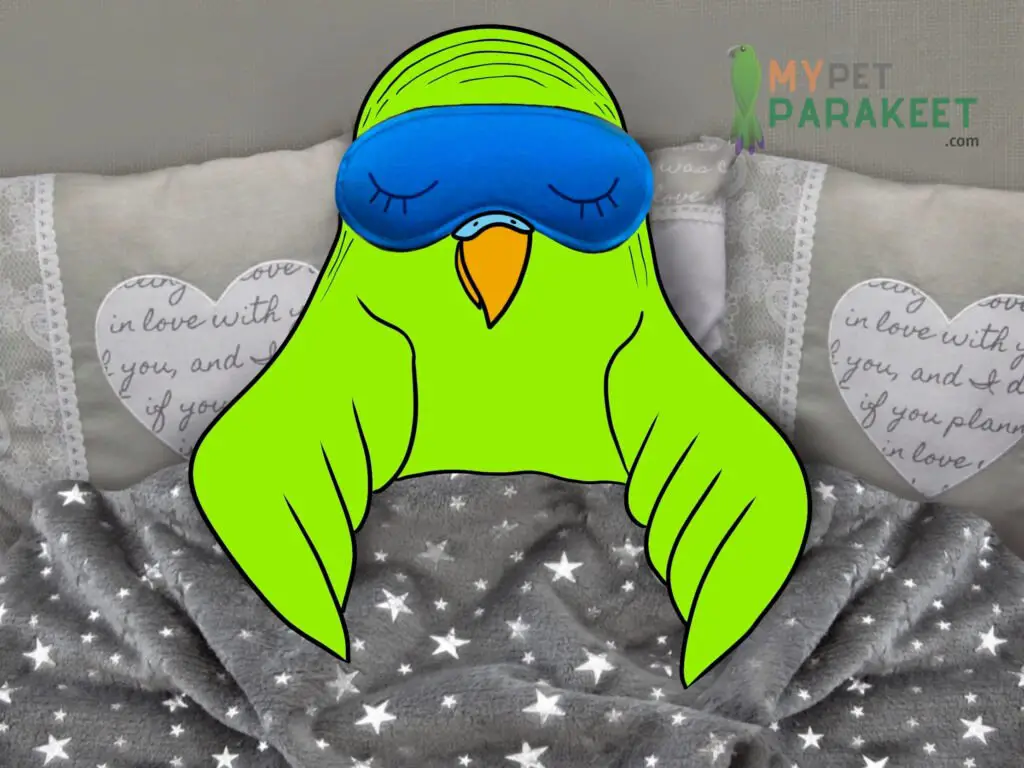
Create A Better Sleep Schedule For Your Parakeet
If your parakeet is struggling to stay awake due to not resting correctly through the night, use these tips to adjust the environment to create a relaxing space and promote your parakeet’s brain and body to relax.
- Keep it quiet – parakeets can be easily startled by noises, both large and small. While some ambience noise may not affect them, any strange or sudden noises can keep them from drifting to sleep and may wake them in the middle of their sleep cycle.
- Dark – just like all diurnal animals, the brain is signalled to rest by producing the chemical melatonin. This is created when darkness is present as it indicates nighttime and a time to rest. Any persistent and blinking lights can be disruptful to your parakeet’s sleep. If you can’t get it dark enough, considering covering your parakeet’s cage.
- Don’t let it get too cold – Parakeets naturally originate from Australia, where the temperature is warm. While it will get colder overnight, it should not get too cold where it makes your parakeet uncomfortable. See what temperatures parakeets require here.
- Plenty of perches – parakeets will sleep perched up high for safety, ensure they are provided with a high and safe place to perch while sleeping. Ensure there are enough perches for all the birds in the cage if they are housed together. Some parakeets may want to sleep near each other, while others may prefer to sleep alone.
- Dimming – when you think about it, the sun outside does not disappear straight away. The light slowly dims away until darkness covers the sky. This time is ideal for the brain to begin winding down to sleep well. If you position the cage in such a way that the light around it dims as the day fades, it can help settle your parakeet into sleep, rather than the abruptness of a light being turned off or a cage covered.
How Much Sleep Do Parakeets Need?
Parakeets need between 8 – 12 hours of restful sleep to be healthy.
Parakeets are a diurnal species, meaning they will be awake and active in the day and sleep through the night. How much sleep they get will depend on the time of year, as the daylight hours will differ through the seasons.
It will be darker for longer in winter to sleep longer – up to 12 hours. The daylight hours will be long in summer, meaning shorter nights for rest – about 8 hours.
Most parakeets will also take an hour or two nap in the afternoon to prepare themselves for evening activity.
How Do I Tell Is My Parakeet Is Asleep?
To tell how much sleep your parakeet is getting, you need to be able to recognise when they are actually asleep, instead of just resting with their eyes closed.
Signs of a sleeping parakeet include:
- Closed eyes
- Resting on one leg – this leg may alternate through the night. Lifting one leg and tucking it into the feathers will keep it warm through the cooler nights.
- Tucked beak under the wing – this position is widespread for many bird species (even the famous “wingless” kiwi bird will tuck their beak where their wing once was!)
- Rhythmic breathing – regular breathing is a sign of a system that is at rest.
Recap
Knowing what is expected and what is not normal is the key to looking after your parakeet and ensuring it has all it needs to thrive – including a restful nights sleep!
Monitor your bird’s behaviour closely and observe any small changes in behaviour so you can pinpoint minor issues and deal with them before they quickly get out of hand.
Create an environment that most closely matches a parakeets natural environment within your ability to provide your pet parakeet with all the opportunities it needs to express natural behaviours to stay physically and mentally stimulated and happy in your home.



